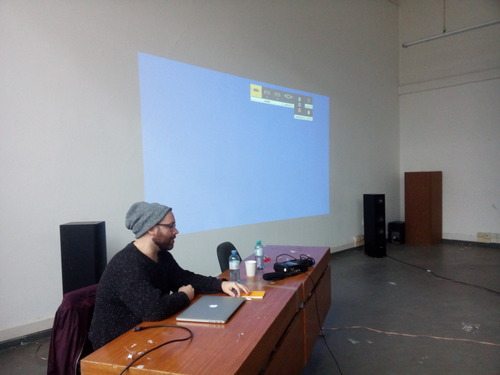(Workshop) 29/01 2015
11:00 AM
Contra-internet
Zach Blas
Contra-internet describes the emerging artistic militancies and political subversions of neoliberal, networked digital technologies. Recognizing the internet as a premier arena of control today, contra-internet is both a refusal of, or exodus from, the internet and also an attempt to build aesthetico-political alternatives to its infrastructures. Aspects of the contra-internet include the global proliferation of autonomous networks and development of encryption tactics.
Poised against the ever popular term “post-internet,” contra-internet is a conceptual, practical, and experimental framework for uniting explicitly political positions that understand internet technologies as bound to mechanisms that vehemently police and criminalize populations—biometric regulation, drone attacks, and data surveillance, to name but a few.
Inspired by Beatriz Preciado’s Manifesto contrasexual, contra-internet is feminist, queer, anti-racist, and anti-imperialist, addressing how non-normative, minoritarian persons are violently impacted by neoliberal network technologies.
Contra-internet practices involve:
- An implicit critique of the internet as a neoliberal agent and conduit for labour exploitation, financial violence, and precarity.
- An intersectional analysis that highlights the internet’s intimate connections to the propagation of ableism, classism, homophobia, sexism, racism, and transphobia.
- A refusal of the brute quantification and standardization that digital technologies enforce as an interpretative lens for evaluating and understanding life.
- A radicalization of technics, which is at once the acknowledgement of the impossibility of a totalized technical objectivity and also the generation of different logics and possibilities for technological functionality.
- A transformation of network-centric subjectivity beyond and against the internet as a rapidly developing zone of work-leisure indistinction, social media monoculture, and the addiction of staying connected.
- Constituting alternatives to the internet, which is nothing short of utopian.
Zach Blas is an artist and writer whose work engages technology, queerness, and politics. Currently, he is an Assistant Professor in the Department of Art at the University at Buffalo.
Blas has exhibited and lectured internationally, most recently at Museo Universitario Arte Contemporáneo, Mexico City; the 2014 Museum of Arts and Design Biennial, New York; the 2014 Dakar Bienniale; Institute of Contemporary Arts, London; Queer/Art/Film LA, Los Angeles; quartier21 / MuseumsQuartier Wien; Center for 21st Century Studies, University of Wisconsin-Milwaukee; transmediale, Berlin; and Foundation for Art and Creative Technology, Liverpool. In 2012 – 13, he was an artist/researcher-in-residence at the b.a.n.g.lab and Performative Nanorobotics Lab, University of California, San Diego. In 2013-14, Blas was a resident at Eyebeam in New York City, The White Building in London, and The Moving Museum in Istanbul.
Reading list:
Beatriz Preciado’s Contra-sexual Contract (Sample) http://totalartjournal.com/archives/1402/the-contra-sexual-manifesto/

